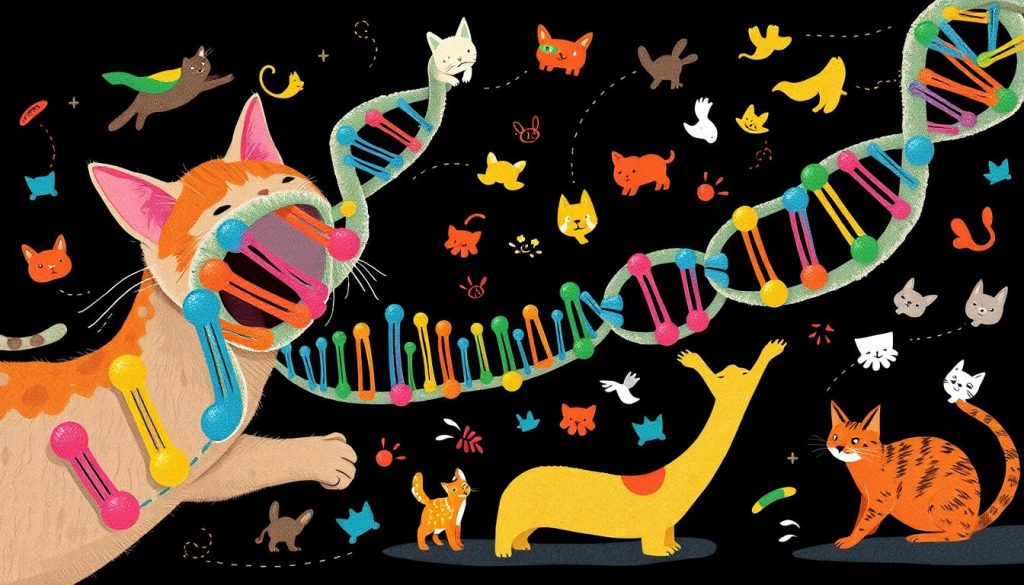Cat owners often wonder about their pets’ quirky behaviors. They ask, “Can cats get autism?” This question comes from seeing odd actions in cats that seem like human autism traits. It’s important to look at this topic with a scientific eye.
Autism in cats is not recognized by vets. The term “autism” is for a complex disorder in humans. Cats might act like they have autism, but it’s usually for different reasons. Knowing about cat behavior helps us understand their actions better.
This article explores the world of cat behavior. We’ll talk about autism in cats, common cat behaviors, and supporting cats with special needs. By the end, you’ll know more about your cat’s personality and needs.
Understanding Autism in Animals: A Scientific Perspective
Scientists are now studying autism in animals, including cats. They want to know how this condition affects different species.
The Neurodevelopmental Nature of Autism
Autism affects how the brain develops and works. In people, it changes how they interact, communicate, and behave. It’s thought that animals might also have similar brain differences, leading to autism spectrum disorder in animals.
Comparing Human and Animal Neural Development
Human and animal brains are different but share some key development stages. Scientists are looking into these similarities to understand animal autism. This research could help us learn more about feline autism spectrum disorder and other animal conditions.
Current Research on Animal Behavioral Disorders
Studies are underway to find and study animal behaviors that look like autism. Researchers are looking at how animals interact, repeat actions, and react to sounds and sights. This research aims to deepen our understanding of animal minds and might give us new insights into human autism.
| Aspect | Human Autism | Potential Animal Autism |
|---|---|---|
| Social Interaction | Difficulties in social communication | Reduced interaction with other animals |
| Repetitive Behaviors | Repetitive movements or speech | Repetitive actions or vocalizations |
| Sensory Sensitivities | Heightened or reduced sensory responses | Unusual reactions to environmental stimuli |
Can Cats Get Autism: Examining the Evidence
Many pet owners and researchers are curious about whether cats can get autism. Autism is mainly found in humans, but some think cats might show similar traits. Let’s look at what science says about autism in cats.
There’s not much research on autism in cats. Vets say cats don’t get autism like humans do. Their brains are very different, making it hard to compare. But, cats can act in ways that seem like autistic behaviors.

- Avoiding eye contact
- Preferring solitude
- Engaging in repetitive actions
- Showing sensitivity to certain stimuli
These behaviors might be due to anxiety, stress, or health issues. It’s important to see a vet if your cat acts strangely.
| Behavior | Possible Cause in Cats | Related to Autism? |
|---|---|---|
| Social withdrawal | Anxiety or illness | No direct link |
| Repetitive movements | Stress or boredom | Not autism-specific |
| Sensory sensitivities | Natural feline traits | Coincidental similarity |
Cats may not get autism, but knowing their unique behaviors helps us care for them better. If you’re worried about your cat’s behavior, always talk to a vet for advice and support.
Common Behavioral Patterns in Cats vs. Autistic Traits
Cats show behaviors that can look like autistic traits in people. Knowing these similarities helps owners spot cat autism signs. It also helps tell normal cat behavior from possible problems.
Social Interaction Patterns
Cats often like to be alone or have limited social time. This can look like autistic behavior. Some cats love to cuddle, while others don’t like being touched. This is normal and doesn’t mean they have autism.
Repetitive Behaviors
Cats do things over and over, like grooming or pacing. These actions are important for them, unlike in autism. If a cat repeats actions too much, it might be stressed or sick, not autistic.
Sensory Sensitivities
Cats have very sharp senses, which can make them react strongly to things. This can seem like sensory issues in autism. If a cat jumps at loud noises or reacts to certain textures, it’s just being a cat, not showing autistic traits.
| Behavior | Typical Cat | Potential Autism-Like Trait |
|---|---|---|
| Social Interaction | Selective sociability | Consistent avoidance of interaction |
| Repetitive Actions | Purposeful repetition | Seemingly pointless, frequent repetition |
| Sensory Response | Heightened but adaptable | Extreme, consistent overreaction |
Recognizing Normal Feline Behavior Versus Signs of Autism in Cats
Cat owners often wonder about their pets’ quirky behaviors. Cats are known for their unique personalities. It’s important to know the difference between normal behavior and possible issues.
Typical cat behaviors include:
- Independent nature
- Occasional aloofness
- Grooming habits
- Territorial marking
Potential red flags that might indicate autistic traits in cats or other behavioral concerns:
- Extreme social withdrawal
- Excessive repetitive movements
- Unusual reactions to normal stimuli
- Inability to adapt to changes in routine
If you notice persistent unusual behaviors in your cat, it’s essential to consult with a veterinarian. They can assess your feline friend and determine if these actions are simply part of their unique personality or signs of a underlying condition requiring attention.
Remember, each cat is an individual. What might be considered odd for one may be perfectly normal for another. By observing your cat’s behavior over time, you’ll develop a better understanding of their unique traits and be better equipped to spot any concerning changes.
Signs That May Mimic Autism-Like Behaviors in Cats
Cat owners might see behaviors in their pets that seem like cat autism symptoms. Cats can’t have autism, but they might act like they do. Let’s look at these signs to better understand our furry friends.
Social Withdrawal Patterns
Some cats seem less social than others. They might hide a lot, avoid contact, or not want to play. This could look like autism, but it’s often just their personality or stress.
Repetitive Movement Behaviors
Cats sometimes do the same thing over and over, like chasing their tail or grooming too much. These actions might seem like autism, but they’re usually signs of boredom, anxiety, or health issues.
Unusual Responses to Stimuli
Cats can react strangely to sounds, textures, or sights. A cat might be very sensitive to certain noises or touch. These reactions might seem like autism, but they’re often just their unique way of sensing things.
| Behavior | Possible Cause | Action |
|---|---|---|
| Hiding frequently | Stress or anxiety | Create safe spaces |
| Excessive grooming | Boredom or anxiety | Increase playtime |
| Sensitivity to sounds | Natural feline behavior | Minimize loud noises |
Understanding these behaviors helps cat owners take better care of their pets. If you’re worried about your cat’s actions, it’s best to talk to a vet for advice and support.
The Role of Genetics in Feline Behavior
Genetics are key in shaping how cats behave. The idea of feline autism is debated, but studying cat genetics can help us understand odd behaviors in cats.

Recent studies found genes linked to cat personality. For example, genes for sociability, aggression, and fearfulness were found in domestic cats. This shows that some behaviors might be passed down through genes.
When talking about autism in cats, remember there’s no direct genetic link. But, some genes might affect behaviors that look like autism. For example, genes that affect how cats sense things might make them more sensitive to their environment.
Breeding cats for certain traits can also shape their behavior. This selective breeding can make some behaviors more common. It shows how genetics and environment work together to form a cat’s personality.
Genetic research on cats is growing, but we must be careful with the topic of feline autism. Cats’ behaviors come from both their genes and their environment. Knowing this can help cat owners meet their pets’ special needs.
Environmental Factors Affecting Cat Behavior
Cat behavior is influenced by many environmental factors. Knowing these can help pet owners care for their cats better. This is key when wondering if cats can get autism or show autistic traits.
Impact of Early Socialization
Early socialization is vital for a cat’s behavior. Kittens that meet different people and animals early in life are more open and calm. Without early socialization, cats might act like they have autism.
Stress and Anxiety Triggers
Cats are very sensitive. Things like changes in routine, new pets, or strangers can stress them out. This stress can make them act like they have autism, like hiding or grooming too much.
Living Space Influences
A cat’s home greatly affects its behavior. Small, messy places can stress them out. Giving them places to hide, vertical spaces, and toys can help. This can reduce stress behaviors that look like autism in cats.
| Environmental Factor | Potential Impact on Behavior | Ways to Improve |
|---|---|---|
| Early Socialization | Increased adaptability, reduced anxiety | Expose kittens to various experiences |
| Stress Triggers | Hiding, excessive grooming | Maintain consistent routines |
| Living Space | Stress-related behaviors | Provide vertical spaces and hiding spots |
Understanding these factors can help cat owners create a better home for their pets. This can reduce behaviors that might look like autism in cats.
Understanding Feline Communication Methods
Cats are complex creatures with unique ways of expressing themselves. It’s important for pet owners to understand their communication methods, which is key when considering feline autism or autistic traits in cats. Cats use various signals to show their needs and feelings.

Vocalizations are a big part of cat communication. Meows, purrs, and chirps help cats talk to humans and other animals. The sound’s pitch, volume, and length can mean different things, like hunger or happiness.
Body language is also vital. Tail positions, ear movements, and facial expressions tell a lot about a cat’s mood and plans. For instance, a high tail usually means a cat is happy and confident. But a puffed-up tail might show fear or anger.
Scent marking is another important way cats communicate. They use scent glands on their body to leave messages for other cats and mark their territory. This is something to watch for when looking at autistic traits in cats, as changes in marking can signal issues.
By paying attention to these communication methods, cat owners can better understand their pet’s needs and actions. This knowledge is very helpful when looking at unusual behaviors or traits that might be linked to feline autism.
Diagnosing Behavioral Issues in Cats
Figuring out behavioral problems in cats needs a careful and detailed approach. Veterinarians and animal behaviorists use special methods to check how cats behave. They look for signs of autism in cats or other problems. This involves both professional checks and standard tests.
Professional Assessment Methods
Vets start with a full physical check to find out if health issues are causing the behavior changes. They watch how the cat acts and reacts to new things. This includes how it interacts with others and any repeating actions.
Behavioral Testing Procedures
Special tests are used to check a cat’s behavior more clearly. These tests put the cat in controlled situations to see how it reacts. Common tests include:
- Social interaction assessments
- Response to novel objects
- Sensory sensitivity evaluations
- Play behavior observations
| Assessment Type | Purpose | Typical Duration |
|---|---|---|
| Physical Examination | Rule out medical issues | 30-60 minutes |
| Behavioral Observation | Assess natural behaviors | 1-2 hours |
| Standardized Tests | Evaluate specific responses | 2-3 hours |
| Owner Interview | Gather historical information | 45-60 minutes |
These methods help experts figure out if a cat’s behavior is normal or if there are deeper issues. Spotting problems early can help manage them better. This is key for cats with special needs.
Treatment Options for Cat Behavioral Challenges
When dealing with unusual cat behaviors, it’s important to explore treatment options. Autism in cats isn’t recognized, but addressing behavioral challenges is key. This improves feline well-being.
Behavioral modification techniques are at the heart of treatment. These methods reward good behaviors and redirect bad ones. For cats with repetitive movements or social withdrawal, gradual exposure therapy can help.

Environmental enrichment is also vital in managing cat behavior. A stimulating space with climbing structures, hiding spots, and interactive toys can reduce stress. This approach is great for cats showing signs of anxiety or restlessness.
In some cases, medical interventions are needed. Veterinarians might prescribe anti-anxiety medications or pheromone therapies for severe behavioral issues. Always use these treatments with behavioral strategies for the best results.
| Treatment Approach | Benefits | Best For |
|---|---|---|
| Behavioral Modification | Improves social interaction, reduces anxiety | Cats with mild to moderate behavioral issues |
| Environmental Enrichment | Reduces stress, encourages natural behaviors | All cats, specially those with sensory sensitivities |
| Medical Interventions | Manages severe anxiety, aids in behavior modification | Cats with persistent or severe behavioral challenges |
By combining these approaches, cat owners can address behavioral challenges. This improves their feline companions’ quality of life. Remember, each cat is unique. Treatment plans should be tailored to individual needs and preferences.
Supporting Cats with Special Behavioral Needs
Cats with unique behaviors sometimes seem autistic. They need extra care and understanding. A supportive environment can greatly improve their lives and help manage feline autism spectrum disorder challenges.
Creating a Supportive Environment
A cat-friendly home is essential for cats with special needs. Offer quiet spaces, hiding spots, and vertical perches. Use soft lighting and avoid loud noises to reduce stress.
Consistent routines help cats feel secure and less anxious. This can make a big difference in their well-being.
Dietary Considerations
Diet is important for managing behavioral issues. Some cats may need special diets for brain health. Talk to a vet to find the best food for your cat’s needs.
Exercise and Enrichment Activities
Regular play and mental stimulation are key for cats with special needs. Use interactive toys, puzzle feeders, and gentle play to reduce stress and promote positive behaviors.
| Enrichment Activity | Benefits | Frequency |
|---|---|---|
| Puzzle Feeders | Mental Stimulation | Daily |
| Interactive Toys | Physical Exercise | 2-3 times daily |
| Gentle Petting | Stress Reduction | As tolerated |
| Climbing Structures | Physical Activity | Always available |
By using these strategies, you can create a nurturing environment. It supports your cat’s unique needs and helps manage feline autism spectrum disorder behaviors.
Working with Veterinary Behaviorists

Veterinary behaviorists are key in solving complex cat behavior issues. They know a lot about animal behavior. They can help with problems that might look like autism in animals.
These experts do many things to help your cat:
- They watch your cat and do tests to understand their behavior.
- They find out why your cat acts strangely.
- They make special plans to help your cat.
- They teach you how to make your home better for your cat.
Ever wondered, “Can cats get autism?” A vet behaviorist can tell you a lot. Cats don’t get autism like people do. But they can act strangely. A vet behaviorist can tell the difference between normal cat behavior and problems.
Working with a vet behaviorist means:
- First, you talk and they assess your cat.
- They might do tests to figure out what’s going on.
- They make a plan to change your cat’s behavior.
- Then, you meet again to see how it’s going.
With a vet behaviorist, you learn more about your cat’s needs. You also find out how to help them feel their best.
The Importance of Early Intervention in Cat Behavior
Early intervention is vital for unusual cat behaviors. Spotting signs of autism or other issues early can greatly improve a cat’s life. Owners can work with vets to find effective ways to manage these problems.
Early help for autistic traits in cats can stop severe behaviors from getting worse. Cats that get support early tend to adapt better and live happier lives. This approach strengthens the bond between pets and their owners.
Here are some benefits of early intervention for cats with behavioral concerns:
- Improved socialization skills
- Reduced anxiety and stress
- Better adaptation to environmental changes
- Enhanced communication with owners
- Increased overall well-being
To show the effect of early intervention, consider this table:
| Behavior Issue | With Early Intervention | Without Early Intervention |
|---|---|---|
| Social withdrawal | Gradual improvement in interactions | Increased isolation and anxiety |
| Repetitive behaviors | Reduced frequency and intensity | Escalation of compulsive actions |
| Sensory sensitivities | Better coping mechanisms | Heightened stress responses |
By tackling signs of autism or other issues early, owners can improve their cat’s life. Early action is key to managing behavioral challenges in cats for the long term.
Building a Strong Bond with Your Cat
Cats, like humans, have their own special personalities. Knowing your cat’s traits is key to a strong bond. This is true for all cats, including those with special needs. It’s important to focus on each cat’s individuality, not wondering if pets can have autism.
Understanding Individual Personality Traits
Every cat has its own quirks and likes. Some are outgoing, while others are shy. By watching your cat’s behavior, you can tailor how you interact with them. This is good for all cats, whether they have autism or not.
Developing Trust and Communication
Trust is the base of a strong bond with your cat. Consistent care and gentle handling build trust. Communication is key too. Learn to read your cat’s body language and sounds. Responding to their needs shows you understand them.
- Provide a safe, comfortable environment
- Offer regular playtime and enrichment activities
- Use positive reinforcement for desired behaviors
- Respect your cat’s personal space
By focusing on your cat’s unique traits and needs, you build a strong bond. This is good for all cats, including those with challenges. Remember, each cat is special and deserves understanding and patience.
Resources for Cat Owners Dealing with Behavioral Concerns
Cat owners facing behavioral challenges can find valuable support. Books like “The Cat Behavior Answer Book” by Arden Moore offer insights into feline behavior. This includes understanding cat autism symptoms. Online platforms such as the Cornell Feline Health Center provide expert advice on managing unusual cat behaviors.
Support groups on social media platforms connect cat owners experiencing similar issues. Facebook groups like “Cat Behavior” allow members to share experiences and seek advice. These communities offer emotional support and practical tips for managing challenging feline behaviors.
Professional organizations like the American Association of Feline Practitioners (AAFP) offer a wealth of information. Their website features articles on feline behavior and a directory of cat-friendly veterinarians. The International Association of Animal Behavior Consultants (IAABC) provides a list of certified feline behavior consultants who can offer personalized guidance.
Remember, while these resources can be helpful, always consult with a veterinarian. They can provide tailored advice and rule out any underlying medical conditions. This is important for diagnosing and treating any behavioral concerns in your cat.
FAQ
Q: Can cats actually get autism?
A: Cats can show behaviors that seem like autism, but they don’t really have it. Autism is a complex disorder found in humans. Cats might act strangely, but it’s usually due to other issues or stress.
Q: What are some behaviors in cats that might be mistaken for autism?
A: Cats might seem autistic if they hide a lot, repeat actions, or don’t respond well. But, these signs can mean stress, anxiety, or health problems. Always check with a vet to find out why your cat acts differently.
Q: How can I tell if my cat’s behavior is normal or if there’s a problem?
A: Watch how your cat interacts, plays, and reacts to things. Normal cat behavior includes being alone, playful, and using sounds to communicate. If your cat’s behavior changes suddenly or seems odd, see a vet.
Q: Are there any treatments for cats with autism-like behaviors?
A: Cats don’t have autism, but they can have behavioral issues. Treatments include changing their environment, training, and sometimes medicine. A vet will decide the best plan based on your cat’s needs.
Q: Can genetics play a role in a cat’s unusual behavior?
A: Yes, genetics can affect a cat’s behavior. Some breeds or inherited traits might seem odd. But, environment and experiences also shape a cat’s personality.
Q: How important is early socialization for cats?
A: Early socialization is key for cats. It helps them be social, adapt, and feel confident. Kittens socialized well are usually happier and less likely to have behavioral problems.
Q: What should I do if I suspect my cat has a behavioral disorder?
A: If you think your cat has a disorder, see a vet first. They’ll check for health issues. If needed, they might send you to a behaviorist for a detailed plan.
Q: Can changes in a cat’s environment cause autism-like behaviors?
A: Changes can stress cats and make them act strangely. Moving, getting a new pet, or changing routines can cause odd behaviors. These are usually temporary and can be managed with care.


















